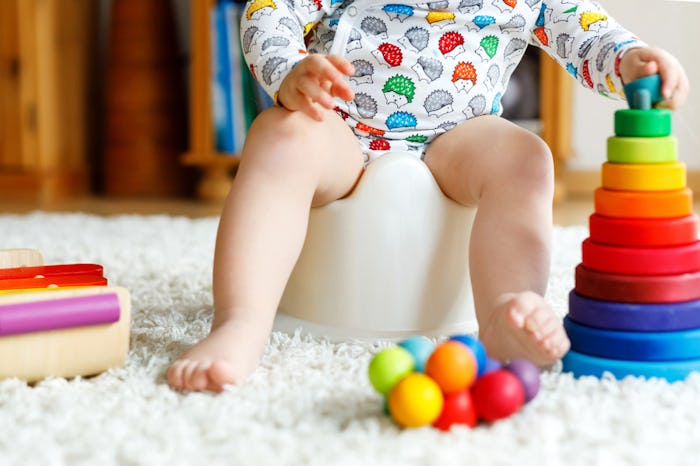Life

7 Cues Your Baby Is Ready To Potty Train & Ditch The Diapers
I was really lucky with my first child — he essentially potty trained himself. It sounds wild, but he simply could not abide the feeling of being dirty, and as soon as we bought him a potty, he started using it. So you can imagine my surprise when my daughter was seemingly uninterested in potty training for what felt like forever. I was gobsmacked by how different their attitudes were, and a bit at a loss. Eventually — thank the gods — I learned the cues that a baby is ready to potty train.
According to American Family Physicians, there are a lot of clues as to whether or not your child is ready to begin the sometimes grueling process of potty training. Some of them are fairly straight forward, but others are easier to miss given how routine they seem. From the period of 18 months until about 4 years of age, you'll be watching your little one very closely, evaluating everything from when they stop pooping in their diaper overnight, to when they can pull on and off their pants mostly unassisted.
If it seems complex, don't worry. Most of it is the ability to clean up a mess and get creative with toilet seat covers in public restrooms. However, some of it requires a few more sleuthing skills.
“Regardless of the method you use, your child is mostly going to dictate how quickly the potty training goes,” Abigail Klemsz, M.D., pediatrician at Indiana University Health said to the Riley Children's Health Blog. Which sounds incredibly frustrating, but it makes sense if you think about it. This is their show — you're merely the trainers. But if you need more prep, look for these seven cues that your baby is ready to potty train.
1No Pooping Overnight
According to American Family Physicians, the ability to go the whole night without soiling a diaper is the first sign your baby is ready to potty train. The website noted that "remaining bowel-movement free overnight is the earliest attained skill, occurring around 22 months of age in girls and 25 months in boys," but it's a range, not a strict set of parameters. Dr. Halima Janjua said for the Cleveland Clinic that bedwetting is something entirely different than pooping at night and noted "bedwetting is not a concern until your child is 5 years old. When your child is older than age 5 and still wetting the bed, you might want to talk with your child’s primary care physician or a pediatric nephrologist or urologist."
2Tugging On Their Pull-Ups Or Diaper
Most parents have seen this behavior at some point, noted the website for Pull-Ups. Your baby pulling or tugging on their diaper or Pull-Up is definitely a sign they're thinking about potty training — and thank goodness, because this can get messy. According to the Mama OT, "Kids will often do this by patting or pointing to their diaper in the presence of their caregiver."
3Hide & Go Pee
According to the American Academy of Pediatrics (AAP), babies might start feeling shame over their habits and look for privacy to go to the bathroom, hiding behind furniture or doors. I remember my son actually going to the bathroom to poop in his diaper. It was the strangest thing. Thankfully, once we put a potty in there, he pretty quickly got the point and started making use of it.
4Bathroom Creeper
This was the one thing I noticed with my daughter. She became the number one bathroom creeper. She'd want to watch me or my son go to the bathroom. According to Family Education, this is not only a good cue they're ready, but a good strategy to get them to complete potty training.
This is true with so many things kids learn to do — they observe and take it all in before they finally show interest. So it's important to show good habits. (Remind older siblings to always wash their hands thoroughly — tiny eyes are watching.)
5They Can Tell You They Need To Go
According to the AAP, the ability to relay to you that they need to go to the bathroom is paramount when examining your child's readiness to potty train. It might not be much more than tugging on their privates and saying "pee pee," but it gets the job done.
6They Take Off Their Clothes
Babies are tiny nudists. The ability to undress and redress is one of the big cues that they're ready to potty train. Mechanics are important, noted American Family Physician. If your child can't pull up their own underwear or pants, it's going to be hard to transition to the toilet.
7They Can Stay Dry For Hours
Your baby needs to be able to stay dry for two hours at a time before you even think of potty training, noted Parenting Science. Think about it — if they can't, you'd be going back and forth all day and night. They're using those muscles and their bladder is preparing for the need to hold its fluid for long periods. Two hours is a good window to judge by.